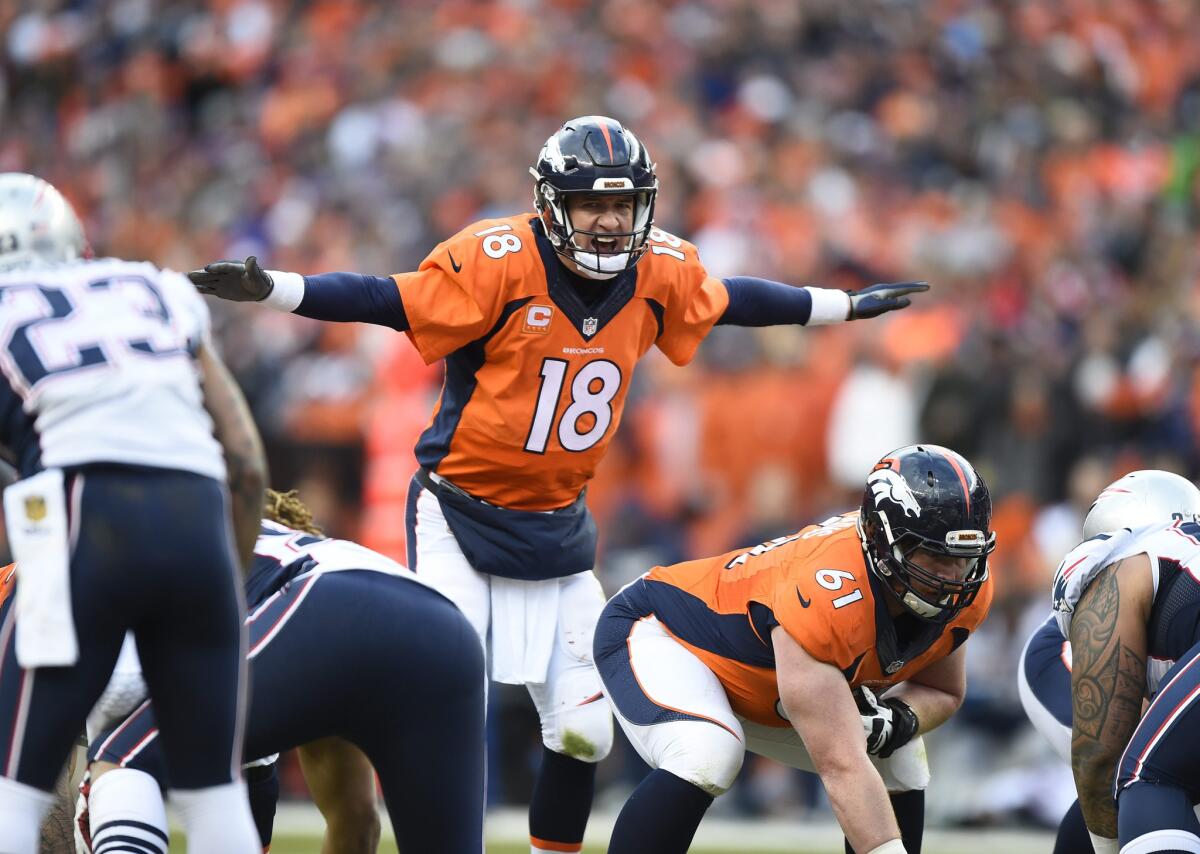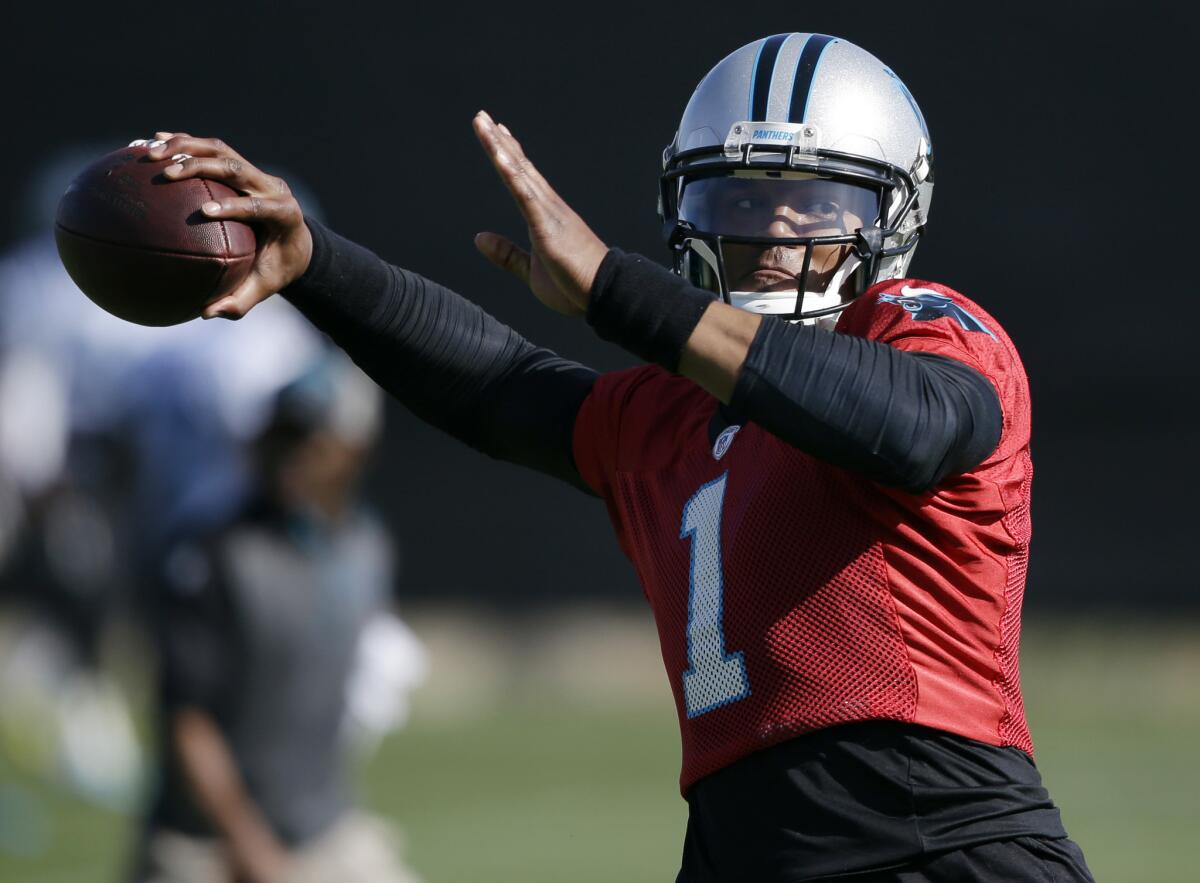Column: Super Bowl QBs Cam Newton and Peyton Manning are a study in contrasts, athletically and stylistically

Broncos quarterback Peyton Manning calls out play signals to his offense during the AFC Championship game against the Patriots on Jan. 24.
- Share via
FROM SANTA CLARA — Carolina Panthers quarterback Cam Newton is the NFL’s version of cool, with his ankle-snapping elusiveness, over-the-top touchdown celebrations, $800 zebra-striped Versace pants.
Peyton Manning, the Denver Broncos quarterback, is the embodiment of old-school tradition, a quarterback in the Johnny Unitas mold who looks out of place at the postgame lectern wearing anything but a sensible business suit.
The two live at opposite ends of the quarterback spectrum and Sunday when the Broncos play the Panthers, Manning and Newton will represent perhaps the most dramatic contrast in Super Bowl history.
See the most-read stories in Sports this hour>>
One has a dad body and turns 40 in a month. The other is sculpted and 14 years younger. One stays in the pocket and hasn’t been a running threat since his Pop Warner days. The other combines pinpoint passes with highlight-worthy runs around — and sometimes over — tacklers, a video game come to life.

Carolina quarterback Cam Newton throws a pass during practice on Feb. 5. in preparation for Super Bowl 50.
Broncos cornerback Aqib Talib, who will be across the line of scrimmage trying to stop Newton in Super Bowl 50, said Newton is the most dangerous quarterback in the NFL.
“He could probably play any position in the NFL he wanted to,” Talib said.
Both quarterbacks do share one quality: they are money-making stars off the field as well as on.
Newton is on his way to being the commercial face of the NFL, making $11 million a year in endorsements that include Drakkar Essence scent from L’Oreal, Dannon Oikos Triple Zero yogurt and EA Sports video games.
Manning slightly out-earns him at $12 million a year as the quintessential middle-America pitchman with endorsements from Buick, Nationwide Insurance and Papa John’s Pizza.
There are plenty of other similarities. They were quarterbacks in the Southeastern Conference: Manning at Tennessee, Newton at Auburn. Each is 6 feet 5 and was selected No. 1 overall in the NFL draft. They are fathers — Manning has 4-year-old twins, Marshall and Mosley; Newton has a newborn son, Chosen.
Each has an impish sense of humor.
Manning, who has hosted “Saturday Night Live,” has the comedic timing of a seasoned pro.
“My high school coach used to always tell me, ‘When you’re sprinting left it’d be a lot easier if you could throw it left-handed, if you were amphibious,” he said this week, pausing for effect. “I think he meant ambidextrous.”
Newton drew laughter when asked last week about meeting Jamaican sprinter Usain Bolt.
“He was a cool guy,” Newton said. “He was like real cool, you know? Like internationally cool. I’m just locally cool.”
Newton has helped put the fun back in football. Fans are in awe when he spins away from would-be tacklers, leaps over linebackers, lowers a shoulder to defensive backs, and crosses the goal line — sometimes by flipping into the end zone.
Fans love his “dab” dance after big plays, when he drops his head while raising his arms to one side as if sneezing into his elbow. They delight in the way he makes a beeline to the stands to hand the football to a fan — always a young fan — after touchdowns and unapologetically rips down banners of visiting fans to protect the Panthers’ home field.
But his theatrics do have detractors, who dislike what they see as showboating.
“I don’t think people have seen what I am or what I am trying to do,” Newton said. “‘Oh, he’s immature. Oh, he’s young.’ . . . I’ve said this since day one: ‘I’m an African American quarterback that may scare a lot of people because they haven’t seen nothing that they can compare me to.’”
People who have been around the game for decades say it’s difficult to find an adequate comparison to Newton.
“How many 6-5, 250-pound quarterbacks have you seen?” said Hall of Fame quarterback Joe Montana, who was 6-2 and 205 pounds when he went 4-0 in Super Bowls for the San Francisco 49ers. “I’m not sure you can find those guys that can run like that. You can’t do what Cam does. Those are few and far between.”
Mike Haynes, 62, a Hall of Fame defensive back, said that while his generation doesn’t necessarily relate to the antics of Newton, he appreciates how entertaining they are.
He said his son and his friends all walk around copying Newton’s dab-dancing celebration.
“If I’m a youth football coach, I wouldn’t let my kids do it, because I’m an old-timer,” Haynes said. “But I’m actually enjoying watching these kids watch football and get excited about football.
“The only thing I’d get on him about is doing those flips,” he said, because he could injure himself. “It only bothers me [because] I’d love to see him play for a long time.”
Manning has been an NFL star since Newton was in high school. This, his 18th season, was interrupted by a foot injury that sidelined him for six of the final seven regular-season games.
Fans still remember the fresh-faced kid who arrived in Indianapolis in 1998 with a pedigree that included a Hall of Fame father, Archie, who played quarterback in the NFL for 22 seasons. Peyton’s younger brother, Eli, is starting quarterback for the New York Giants.
Manning won only three games his first season but then posted 13 wins in his second, energizing both a city and state with his passion, poise and leadership. Despite a lofty career that includes 14 Pro Bowl selections, he’s dogged by the reputation of failing in the postseason, with a 13-13 record and only one Super Bowl victory.
Manning hasn’t said whether he plans to retire after the Super Bowl, although an on-field microphone caught him telling New England Coach Bill Belichick after the AFC championship game: “This might be my last rodeo.”
Not surprisingly, health issues are cropping up for the quarterback who missed the 2011 season because of a neck injury that required four surgeries. He said that almost three years ago, a doctor told him he would need a hip replacement at some point.
“I said ‘Doc, I didn’t ask you if I was going to have a hip replacement . . . but thanks for sharing,’” Manning said.
This is the fourth consecutive year that the Super Bowl has pitted a dual-threat quarterback and a traditional drop-back passer. Before this, it was San Francisco’s Colin Kaepernick against Baltimore’s Joe Flacco, then Seattle’s Russell Wilson facing Manning, and Wilson against New England’s Tom Brady.
“It seems like every year, they say: ‘The pocket passer is a dying breed and will no longer be,’” Manning said. “And I kept saying: ‘Well, I hope that’s not true because I will be out of a job and my brother will be pretty close behind me.’ We enjoy this profession, but hey, I think there are different types of quarterbacks and different ways to be effective.”
Newton, who realizes he’s become both a magnetic and polarizing figure, shrugs that off the way he does would-be tacklers.
“I’m given a stage . . . for people that are watching this live and saying, ‘Damn, Cam’s cool,’ [and] for these same people that are saying, ‘Hell, I hate Cam,’” he said. “Either way, I’m going to stay true to who I am and try to fulfill the things that are important to me.”
Follow Sam Farmer on Twitter @LATimesFarmer
More to Read
Go beyond the scoreboard
Get the latest on L.A.'s teams in the daily Sports Report newsletter.
You may occasionally receive promotional content from the Los Angeles Times.











